
BLUE PVC PIPES SAPPMA-approved PVC pipes ready for dispatch and installation at a client's respective site
Despite post-election economy concerns and the lack of funding plaguing the plastic pipe industry, Southern African Plastic Pipe Manufacturing Association (SAPPMA) CEO Jan Venter believes that the industry will grow in the third quarter of this year, as well as in 2025.
This is largely owing to local plastic pipe manufacturers having the capacity to produce large quantities of high-quality plastic pipes using polyvinyl chloride (PVC) and high-density polyethylene (HDPE) for use in local applications, as well as for industrial and mining purposes throughout Africa and worldwide.
PVC and HDPE plastic pipes maintain a highly versatile characteristic, as these plastic pipes can be used in agriculture, domestic, infrastructure, mining and telecommunications applications. For example, some of the multisectoral processes that require the use of plastic pipes include irrigation, water distribution, sewage disposal, slurry operations, plumbing, as well as ducting for cables and fibre optics.
“The spectrum of application of PVC and HDPE pipes is very wide. These are versatile materials with many benefits, particularly in the long term,” he says.
Consequently, this versatility offers economic benefits for South African industries and plastic pipe industry stakeholders, in addition to enhancing business opportunities for plastic pipe producers during a time of lower local demand, says Venter.
Further, it is important to ensure that members operating in the local plastic pipe industry meet the standards of application criteria such as, for example, supplying pipes for freshwater reticulation, when undertaking critical projects.
For this reason, SAPPMA bestows its mark of accreditation upon verified plastic pipe producers and affiliated suppliers as part of its continuous efforts to “improve and maintain standards in the very important plastic pipes industry”, says Venter.
Despite the hindrances of high transport costs and poor operations at South African ports, Venter says that there could be a “great benefit” for the domestic plastic pipe manufacturing industry to flourish from the growing demand of the export of pipes to international markets, as production capacity and quality adheres to, both, local and international standards.
“We believe that our unannounced factory audits and strict code of conduct before displaying the SAPPMA mark provides additional peace of mind for the end-user,” he highlights.
In addition to the optimal capacity of the South African plastic pipe industry, its ability to mass-manufacture quality-assured plastic pipes, and export locally and internationally to various clients, Venter also highlights the ongoing environmentally conscious values and goals honed by the plastic pipe industry and manufacturers.
Environment-Friendly Pledge
The plastic pipes industry holds great consideration for environmental preservation and decarbonisation, states Venter, who points to the vast extent of recycling that is practised in the industry.
Pipe-grade polymer is recycled on a “grand scale”, owing to the expensive cost of buying virgin material. This, Venter says, ensures that little to no plastic pipe waste is discarded into the environment, thereby adding green credentials to the plastic pipe processing and manufacturing procedure.
Despite recycled plastic pipe materials not being approved for use in the manufacture of verified plastic pipes, these materials can be used for the manufacturing of alternative plastic pipe products.
“Pipe standards have been fine-tuned over many years to where they are now – capable of ensuring lifetimes of more than 50 years, when correctly followed,” he concludes.